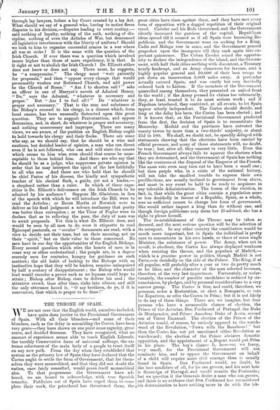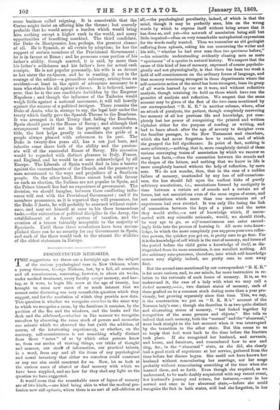THE THRONE OF SPAIN.
WE are not sure that the English world, ourselves included, have quite done justice to the Provisional Government of Spain. With all their blunders—and some of their blunders, such as the delay in assembling the Cortes, have been very grave—they have shown on one point some sagacity, great nerve, and decided firmness. They have recognized, what no amount of experience seems able to teach English Liberals, the terribly Conservative force of universal suffrage, the extreme reluctance of the main body of a people to trust itself on any new path. From the day when they established that system as the primary law of Spain they have declared that the Cortes ought to settle the form of Government, that for themselves they were monarchical, and that they did not doubt the nation, once fairly consulted, would prove itself monarchical also. To that programme the Government have adhered, we are bound to acknowledge, with true Spanish tenacity. Publicists out of Spain have urged them to coin great cities have risen against them, and they have met every form of opposition with a dogged repetition of their original creed. Castelar and his Reds threatened, and the Government silently increased the garrison of the capital. Republican ideas spread till it seemed as if all Spain wore becoming Republican, and the Government went on seeking for a King. Cadiz and Malaga rose in arms, and the Government poured grapeshot upon the insurgents till they sank again into expectant quiescence. The Cuban Creoles seized the opportunity to declare the independence of the island, and the Government, with half their cities seething with discontent, a Treasury nearly bankrupt, and an Army clamorous for favours, sent a highly popular general and 10,000 of their best troops to put down an insurrection 3,000 miles away. A pretender actually entered Spain, and was curtly but very decidedly ordered back to Lisbon. If the members of the Government quarrelled among themselves, they presented an united front to the world ; if the Army pressed its claims too vehemently, they, at least, trusted it to do most serious work ; and if Napoleon interfered, they contrived, at all events, to let Spain, appear utterly independent. The Cortes should decide, and long as the delay has been, the Cortes has been elected ; and it is known that, as the Provisional Government predicted from the first, the decision of Spain is to reconstitute the Monarchy. Madrid and the provinces have outvoted the county towns by more than a two-thirds' majority, or about 252 to 100. We shall, we doubt not, be speedily deluged with. statements showing that the elections have been carried by official pressure, and many of those statements will, no doubt, be true ; but, after all, they amount to very little. Even the French Government always fails to squeeze the electors when they are determined, and the Government of Spain has nothing like the resources at the disposal of the Emperor of the French. The mass vote even may turn out to have been a small one ; but then people who, in a crisis of the national history, will not take the smallest trouble to express their own. predilections, are usually inclined to government from above, and must in any event be held to be ready to acquiesce in any tolerable Administration. The lesson of the election, intact, is, that while the great cities contain a population more or less decidedly in favour of a Republic, Spain, as a whole, sees no sufficient reason to change her form of government. She would rather import a king than do without one, and though foreign politicians may deem her ill-advised, she has a right to please herself.
The re-establishment of the Throne may be taken as decreed, and the next serious question will be the selection of its occupant. In any other country the constitution would be much more important, but in Spain the individual is pretty sure to concentrate in his own hands, or those of some single Minister, the substance of power. The Army, when not in revolt, is obedient, the Cortes has always displayed weakness when resisting the throne, and the populace of Madrid,— which is a genuine power in politics, though Madrid is not Paris,—is decidedly on the side of the Palace. The King, if at all popular, will probably after a year or two do pretty much as he likes, and the character of the man selected becomes, therefore, of the very last importance. Fortunately, or unfor tunately, the number of possible candidates is reduced by cir cumstances, by pledges, and by personal considerations to a very narrow group. The Cortes is free, and could, therefore, we presume, order a Restoration, or elect a Bonaparte, or vote for Espartero, or offer the Crown to Prim ; but it is not likely to do any of these things. There are, we imagine, but four persons who have a measurable chance of election, the Prince of the Asturias, Don Ferdinand of Portugal, the Duke de Montpensier, and Prince Amadeus Duke of Aosta, second son of Victor Emanuel. The election of the Prince of the
Asturias would, of course, be entirely opposed to the watchword of the Revolution, "Down with the Bourbons ! " but then the Cortes has not yet sanctioned either Revolution or watchword ; the election of the Prince obviates dynastic opposition, and the appointment of a Regent would put Prim in his place. The boy's chance is, however, we fancy, very small, for the Provisional Government will not nominate him, and to oppose the Government on behalf
of a child will require more civil courage than is usually found in Spain. Don Ferdinand would, no doubt, be the best candidate of all, for he can govern, and his next heir
is Sovereign of Portugal, and would reunite the Peninsula ; but we question if the Generals desire a man who can govern, and there is no evidence that Don Ferdinand has reconsidered
some business called reigning. It is conceivable that the Cortes might insist on offering him the throne ; but scarcely probable that he would accept a burden which would bring him nothing except a higher rank in the world, and many opportunities of benefiting mankind. The third candidate, the Duke de Montpensier, has, perhaps, the greatest chance of all. He is Spanish, at all events by adoption; he has the support of certain members of the Provisional Government ; he is in favour at Rome ; and he possesses some portion of his father's ability, though marred, it is said, by more than his father's selfishness and his father's love for actual cash .receipts. He is not popular personally, his wife is as devout as her sister the ex-Queen, and he is wanting, if not in the courage of the soldier—a groundless calumny, arising from an accident—at least in the spirit of adventure necessary to a man who stakes his all against a throne. It is believed, moreover, that he is the one candidate forbidden by the Emperor Napoleon ; and though the influence of the Tuileries would weigh little against a national movement, it will tell heavily against the success of a political intrigue. There remains the Duke of Aosta, who is, strange to say, the legal heir under the treaty which finally gave the Spanish Throne to the Bourbons. It was arranged in that Treaty that, failing the Bourbons, Spain should pass to the House of Savoy ; and although that arrangement would not in the present age constitute a title, the fact helps greatly to conciliate the pride of a people always pleased with references to its past. The Duke is twenty-five years old, has a son just born, and inherits some share both of the ability and the passionate will of the successful House of Savoy. His accession would be regarded with distinct pleasure in Italy, France, and England, and he would be at once acknowledged by all Europe. The Liberals of Spain would find in him a barrier against the encroachments of the Church, and the peasantry a man accustomed to the ways and prejudices of a Southern people. On the other hand, Rome cannot look with favour on such an election, the Italians are not popular in Spain, and the Prince himself has had no experience of government. The decision, we should imagine, between these conflicting influences will rest with the Provisional Government ; and if its members pronounce, as it is reported they will pronounce, for the Duke d'Aosta, he will probably be crowned without resistance, and may set himself at once to his three tremendous tasks,—the restoration of political discipline in the Army, the establishment of a decent system of taxation, and the creation of a tenure tolerably acceptable to the majority of Spaniards. Until those three revolutions have been accomplished there can be no security for any Government in Spain, and each of the three would task to the utmost the abilities of the ablest statesman in. Europe.



































 Previous page
Previous page